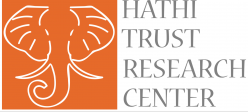This fall we are piloting the workshop curriculum at all five partner institutions. In this post, librarian Eleanor Dickson shares her thoughts after leading a DDRF workshop at the University of Illinois at Urbana-Champaign. Feedback from all of the partners along with the assessment forms collected from attendees will inform development of our next iteration of workshop materials for spring 2017. You can read more about the modular DDRF curriculum in this update.
Q. Was there anything that worked particularly well in the workshop?
A. This was our second time leading at DDRF workshop at Illinois, and our session this time was an hour longer than our first pilot workshop in spring 2016. It worked better to have three hours to teach as opposed to two hours. We felt much less rushed. If we were to teach a two hour DDRF workshop again, I would be more selective about what was included and what was left out. This semester we also piloted the “Visualizing Text Data” module activity using the HathiTrust+Bookworm (HT+BW) tool. It was interesting to see how the librarians in the audience approached HT+BW, and it seemed they benefited from the opportunity to bring their own research question to the tool.
Q. Was there anything that surprised you during the workshop?
A. Both times we have taught the workshop, I have been surprised by the range of experience levels with various technical topics among attendees. Experience level does not easily break down along lines of job titles or years in the field. The range of base-line knowledge in the room during the workshop can make it challenging to pace the activities appropriately, but we have also seen that some attendees with greater experience have been willing to help their less experienced neighbors through activities.
Q. If you could change one thing that you did in the workshop to make the sessions more effective, what would it be?
A. I would continue to improve our hands-on activities. I feel that they have gotten better from our first iteration of the workshop, but I’d still like to see us expand and modify them as we go forward. I would like to make them more interactive, with more time for discussion and reflection. I would also like to find ways to draw on attendees’ past experience with digital scholarship projects and reference questions. This change might ground and contextualize the research examples we provide during the introduction.
Q. What tips would you give to somebody else teaching similar workshops?
A. Be prepared: run through examples and activities ahead of time and try to anticipate where attendees might have difficulty. For example, this semester we provided all the Python commands to attendees in a text file. The file rendered well on our Mac laptops, but displayed poorly on the Windows computers in the lab we used. That said, something always seems to go wrong during technical workshops. These issues may be unavoidable, and often are neither your fault nor the fault of the attendees. Try to help attendees understand when their errors are things they can fix (such as entering a command properly) and when they are largely out of their control (such as software installing in an unexpected way).
Q. How would you encourage a fellow librarian to play a more active role in supporting data-driven research?
A. I would encourage them to look for opportunities to play with various tools and methods for their own inquiries. Hands-on experience is key when learning technical topics, and by applying their experimentation to a question of interest to them, the skills are more likely to stick.
